浙江省嘉兴市秀洲区七年级英语下册词法语法手册Module10Aholidayjourney复习素材新版外研版
- 格式:doc
- 大小:89.00 KB
- 文档页数:5
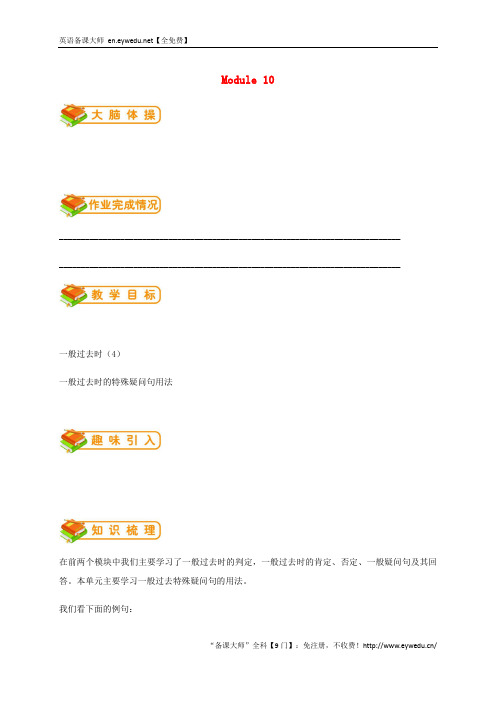
Module 10____________________________________________________________________________________________________________________________________________________________一般过去时(4)一般过去时的特殊疑问句用法在前两个模块中我们主要学习了一般过去时的判定,一般过去时的肯定、否定、一般疑问句及其回答。
本单元主要学习一般过去特殊疑问句的用法。
我们看下面的例句:--When did he die?--He died in 1900.--How long did the rain last?--It lasted four hours.--Why did he come back late?--Because he wanted to finished the work.综上,我们发现一般过去时的特殊疑问句的用法与一般现在时的特殊疑问句在结构上没有太大的差异,只是使用的助动词不同而已。
单项选择1.--__________did you go there?--Two years ago.A.WhenB.WhereC.WhyD.How答案:A解析:考查一般过去时特殊疑问句的用法,根据回答“两年前”故答案是A。
2.--__________did it take to get there?--About nine hours.A.How farB.How oftenC.How longD.How many答案:C解析:考查一般过去时特殊疑问句的用法,根据回答“9个小时”是时间段故选C。
3.--__________did you buy?--Two bags.A.WhenB.WhereC.WhyD.What 答案:D解析:根据句子回答可知是买了什么,故选D。

Module 10 A holiday journey知识点详解一、词法1. meet v. 迎接;遇见,碰见;结识,被引见介绍eg:Will you meet me at the station? 你要到车站接我吗?I met him in the street. 我在街上遇见了他。
e and meet my family. 来认识一下我的家人。
2. excited adj. 感到兴奋的、激动的,表示人的心理感受,作表语时,主语为人。
exciting adj.令人兴奋的,表示某事(物)给人的感受,作表语时,主语为物。
eg: I was excited to hear the good news. 听到这个消息我很激动。
The exciting news made me feel excited. 这个令人激动的消息令我很激动。
3. any adj. 任何的只作定语,多用于疑问句、否定句或条件状语从句中。
后面可跟可数名词复数,也可跟不可数名词。
eg:He doesn’t have any books. 他没有任何书。
任何一个(三者或三者以上),用于肯定句中。
eg:You can buy the book at any bookshop. 你可以在任何一家书店买到这本书。
any用作代词,意为“无论哪一个,无论哪些”eg:If any of your friends is /are interested, let me know. 如果你的朋友们有谁感兴趣,告诉我。
4. tired adj.①疲倦的,劳累的After a day’s work, I feel tired. 一天工作之后我好累。
②厌倦的,厌烦的I’m tired of my boiled eggs. 我厌倦了煮鸡蛋。
5. relax v. 放松relax sb./oneself 放松某人/某人自己eg:I need a cup of tea to relax myself. 我需要一杯茶来放松一下。
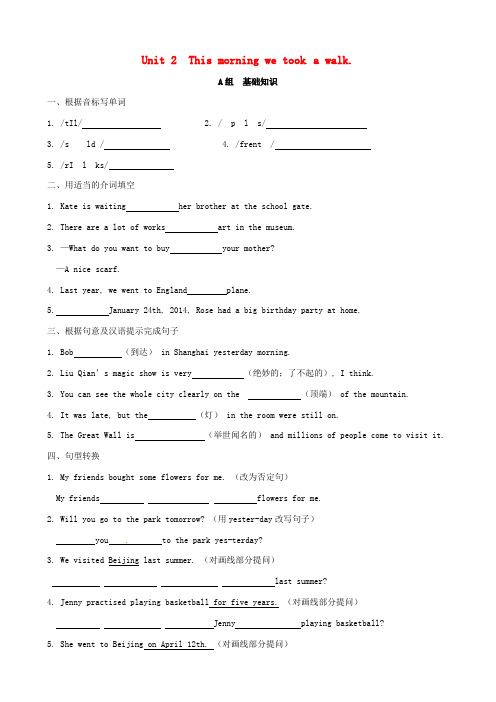
Unit 2 This morning we took a walk.A组基础知识一、根据音标写单词1. /tIl/2. /p l s/3. /s ld /4. /frent/5. /rI l ks/二、用适当的介词填空1. Kate is waiting her brother at the school gate.2. There are a lot of works art in the museum.3. —What do you want to buy your mother?—A nice scarf.4. Last year, we went to England plane.5. January 24th, 2014, Rose had a big birthday party at home.三、根据句意及汉语提示完成句子1. Bob (到达) in Shanghai yesterday morning.2. Liu Qian’s magic show is very(绝妙的;了不起的), I think.3. You can see the whole city clearly on the (顶端) of the mountain.4. It was late, but the (灯) in the room were still on.5. The Great Wall is (举世闻名的) and millions of people come to visit it.四、句型转换1. My friends bought some flowers for me. (改为否定句)My friends flowers for me.2. Will you go to the park tomorrow? (用yester-day改写句子)you to the park yes-terday?3. We visited Beijing last summer. (对画线部分提问)last summer?4. Jenny practised playing basketball for five years. (对画线部分提问)Jenny playing basketball?5. She went to Beijing on April 12th. (对画线部分提问)she to Beijing?6. Mr Shute taught us English when we were young. (对画线部分提问)you English when you young?7. They go to school by bus. (对画线部分提问)they go to school?8. I enjoyed myself in Qingdao yesterday. (改为同义句)I in Qingdao yesterday.B组能力提升一、完形填空The Great Wall of China has a history of 1 two thousand years. It spreads from the east 2 the west in North China. It is about 6,300 kilometres 3 . It is o ften 4 “The Ten-thousand-li Great Wall”. It is one of the “Seven Wonders” of the ancient world.The Great Wall is wide enough 5 ten men to 6 . Horses can run along it too. The Great Wall 7 stones and bricks(砖). There are huge stones on 8 side and on the highest part. But now some sections of it are worn out.There are tall watchtowers along the Great Wall. Once upon 9 time, the soldiers kept watching the enemies(敌人) 10 the watch-towers day and night. They made 11 on the towers to 12 each other when the enemies came.Nowadays we don’t use the Great Wall to keep away the enemies any more. It is a famous place of interest to all the people in 13 . Every year 14 people come to visit 15 from all ov er the world.()1. A. over B. in C. on D. more()2. A. to B. on C. in D. over()3. A. wide B. tall C. long D. short()4. A. calling B. call C. called D. to call()5. A. for B. to C. and D. about()6. A. pass B. go C. live D. work()7. A. was made of B. was made from C. was made in D. was made by ()8. A. both B. all C. each D. neither()9. A. an B. a C. the D. /()10. A. in B. on C. over D. across()11. A. fires B. kites C. faces D. cameras()12. A. tell B. talk C. speak D. say()13. A. Asia B. the world C. Europe D. Africa()14. A. thousand B. a few thousand C. thousands of D. thousands()15. A. it B. itself C. her D. she二、阅读理解Last summer Cathy’s family went to New York City for their summer vacation. They stayed there for two weeks.New York City has about seven and a half million people. It is the largest city in the United States. First, they visited the Statue of Liberty. It is one of New York’s best-known historical sites(历史景点). Millions of people visit it every year. On the second day, they went to the Empire State Building. From the top of the building, they saw most parts of New York. On the third day, they visited the Metropolitan Mus-eum. In the museum, they saw a lot of famous paintings. During the rest time of the week, Cathy went to Bronx Zoo with her younger brother and sister.In the second week, the family visited Long Island. They all had a great time.()1. Cathy’s family visited places of interest according to the passage.A. threeB. fourC. fiveD. six()2. Cathy’s family stayed in New York City .A. in two weeksB. two weeks agoC. two weeks laterD. for two weeks()3. New York City has about people.A. 7,000,000B. 7,500,000C. 8,000,000D. 8,500,000()4. The underlined(画线的) word “It” refers to(指)“”.A. New YorkB. The United StatesC. Cathy’s homeD. The historical site()5. Cathy’s family visited in the second week of their vacation.A. the Statue of LibertyB. Long IslandC. the Metropolitan MuseumD. the Empire State Building三、用方框中所给单词的适当形式填空1. Stop working. Let’s for one hour.2. Jane, don’t worry about the kids!I’ll stay here you come back.3. My uncle can speak very well.4. There are many beautiful in the old city.5. What did you in your shop last year?四、语法填空阅读下面短文,按照句子结构的语法性和上下文连贯的要求,在空格处填入一个适当的词或使用括号中词语的正确形式填空(每空不多于2个单词)。
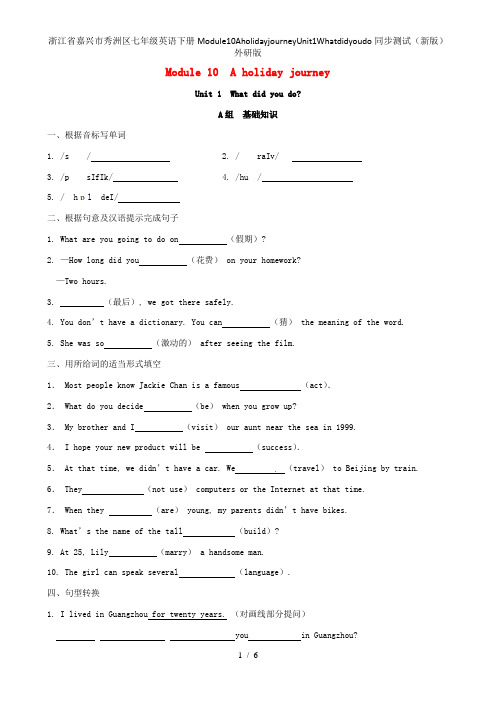
Module 10 A holiday journeyUnit 1 What did you do?A组基础知识一、根据音标写单词1. /s/2. /raIv/3. /p sIfIk/4. /hu/5. /h l deI/二、根据句意及汉语提示完成句子1. What are you going to do on (假期)?2. —How long did you (花费) on your homework?—Two hours.3. (最后), we got there safely.4. You don’t have a dictionary. You can(猜) the meaning of the word.5. She was so (激动的) after seeing the film.三、用所给词的适当形式填空1. Most people know Jackie Chan is a famous (act).2. What do you decide (be) when you grow up?3. My brother and I (visit) our aunt near the sea in 1999.4. I hope your new product will be (success).5. At that time, we didn’t have a car. We (travel) to Beijing by train. 6. They (not use) computers or the Internet at that time.7. When they (are) young, my parents didn’t have bikes.8. What’s the name of the tall(build)?9. At 25, Lily (marry) a handsome man.10. The girl can speak several (language).四、句型转换1. I lived in Guangzhou for twenty years. (对画线部分提问)you in Guangzhou?2. They went to the airport this morning. (对画线部分提问)they to the airport?3. She enjoyed herself last week. (改为同义句)She last week.4. Do you often help them this year? (用last year改写句子)you often them last year?5. are, play, they, going, football, to, tomorrow (.)(连词成句)B组能力提升一、完形填空Last summer I spent my vacation 1 my family in Beijing. Our train got to Beijing at eight in the evening. We 2 in a hotel near Tian’anmen Square. We got up early the next morning 3 we wanted to watch the flag-raising ceremony(升旗仪式) in Tian’anmen Squ-are. There were many peop le in the square 4 we got there. I was very 5 to watch the national flag(国旗) go up. Then we went to 6 the Palace Museum(故宫博物院). We spent all the 7 visiting it. In the afternoon, we went to the Great Wall. We took a bus there. We were happy and 8 on the bus. When we arrived at the Great Wall, it was 2:00 pm, we 9 many photos there. How beautiful the Great Wall is!I love 10 very much.()1. A. of B. with C. in D. on()2. A. went B. joined C. came D. lived()3. A. because B. so C. but D. and()4. A. what B. why C. when D. where()5. A. interesting B. boring C. bored D. excited()6. A. look B. visit C. walk D. draw()7. A. morning B. day C. week D. evening()8. A. busy B. relaxed C. fresh D. ready()9. A. carried B. brought C. took D. left()10. A. them B. one C. it D. him二、阅读理解The summer vacation is over. Time always flies fast. During the vacation, the weather was hot and I couldn’t do much work, but I lived happily.Because it was hotter in the afternoon, I did my homework in the morning. I got up at 6:30 am and took a walk in the garden for half an hour.After breakfast, I read English and Chinese and did some maths exercises. It took me three hours or more to finish my homework. I worked quite hard and made good progress(进步).I spent the afternoon outside. I went to swim and it was fun. I came home at about five or six o’clock. Sometimes a friend of mine would come to see me, and we would spend some time listening to music.In this way I spent my vacation happily. I not only studied but also became a good swimmer. Now I’m in good health and in high spirits.()1. The passage mainly tells us .A. how the writer spent his summervacationB. what the weather was like in the summerC. when the writer went to bed in the eveningD. where the writer finished his home-work()2. It took the writer to finish his homework every morning.A. half an hourB. only one hourC. two hours and a halfD. three hours or more()3. The writer spent most of the afternoon .A. Listening to musicB. going swimmingC. walking in the gardenD. visiting his friends()4. The writer had a very good summer vacation because he .A. worked very hard and made good progressB. swam better and studied wellC. got up early and went home lateD. liked swimming better than studying()5. Which of the following is NOT true?A. The writer made progress in his lessons.B. The writer took a walk for half an hour before breakfast.C. The writer began to study after he got up.D. The writer spent more time swimming than listening to music.三、语法填空阅读下面短文,按照句子结构的语法性和上下文连贯的要求,在空格处填入一个适当的词或使用括号中词语的正确形式填空(每空不多于2个单词)。
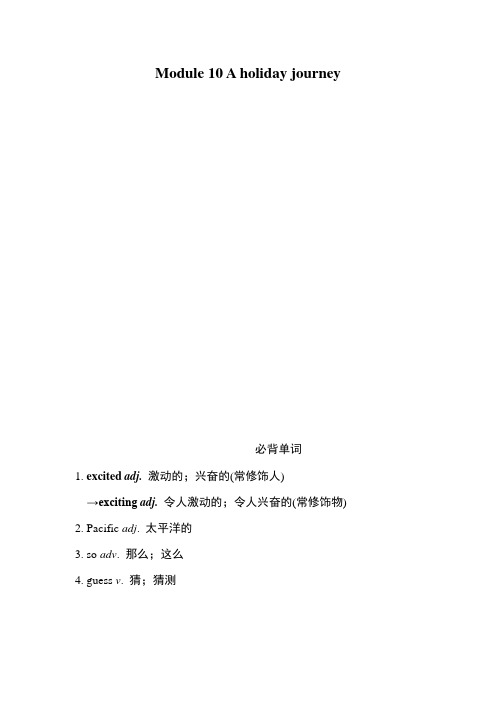
Module 10 A holiday journey必背单词1. excited adj. 激动的;兴奋的(常修饰人)→exciting adj.令人激动的;令人兴奋的(常修饰物)2. Pacific adj. 太平洋的3. so adv. 那么;这么4. guess v. 猜;猜测必背短语5. go on holiday 去度假6. how long 多长时间7. movie star 电影明星8. a lot 很,非常9. the Pacific Ocean 太平洋必背句子10. How long did it take to get there?到达那儿花了多长时间?11. Guess what?猜怎么着?12. I was so excited!我太激动了!13. It was great!太棒了!必背单词1. arrive v.到达→arrived(过去式)2. relax v.放松→relaxing adj.令人放松的(常修饰物)→relaxed adj.感到放松的(常修饰人)3. French adj. 法国的;法语的n. 法国人;法语→France n.法国4. sell v. 卖;出售→sold(过去式)5. till conj.直到……为止→until(同义词)6. world-famous adj. 举世闻名的7. top n. 顶端8. light n. 电灯9. on adv. 在使用中;开着的10. wonderful adj. 绝妙的;了不起的11. palace n. 宫殿必背短语12. the day before yesterday 前天13. at the airport 在机场14. do some shopping 购物15. wait in line 排队等候16. such as 例如必背句子17. We were tired so we relaxed at home and began our tour of the cityyesterday.我们累了,因此在家休息了一下,昨天才开始我们的城市之旅。
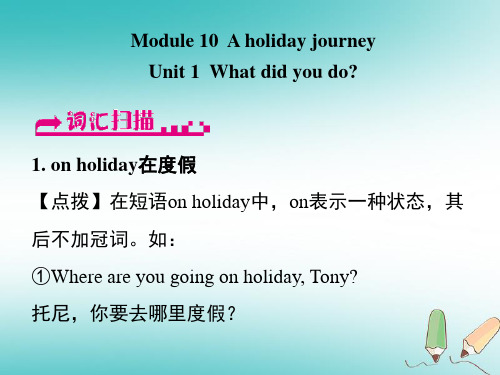
Module 10 A holiday journey语法精选1. so 那么;因此;如此(1)so作副词,意为“那么(尤指用于引出新话题);这么,那么(用于强调质量、感觉或数量)”。
如:①Don’t be so w orried. 别这么担心。
②So what did you do in Los Angeles?那么你在洛杉矶做了什么?so作副词还意为“(指刚说过的事物)这样;如此”。
如:—Is he coming? 他来吗?—I hope so. 我希望如此。
(2)so作连词,意为“所以;因此”。
如:I like travellin g, so I like holidays.我喜欢旅游,所以我喜欢假期。
2. excite, excited与exciting(1)excite是动词,意为“使……激动”;excited是形容词,意为“激动的;兴奋的”,修饰人。
如:The woman is so excited when she sees her lost boy.当她看到她丢失的孩子时,那个女人是如此激动。
(2)exciting是形容词,意为“令人激动的;令人兴奋的”,修饰物。
如:The news is exciting.那个消息是令人激动的。
句法精析1. Guess what?你猜怎么着?用于向对方讲述一件自己认为会让对方感到惊讶的事情之前,字面意思是让对方猜,但通常是紧接着说出想说的事情。
如:—You look so excited!你看起来很兴奋!—Guess what? I won a computer.你猜怎么着?我赢了一台电脑。
2. I hope y ou like it. 我希望你喜欢它。
hope意为“希望”,它有许多种用法。
(1)hope用作及物动词,意为“期望;希望”,后面可接不定式或宾语从句。
如:Tom hopes to hear from you soon.=Tom hopes he can hear from you soon.汤姆希望尽快收到你的来信。
浙江省嘉兴市秀洲区七年级英语下册Module10Aholidayjourney测试外研版Module 10 模块测试听⼒部分(20分)⼀、听⼒(20分)第⼀节:听⼩对话,回答问题。
(5分)()1. When did Jim’s birthday party begin?A. At 5:00.B. At 5:30.C. At 6:30.()2. When did Betty’s aunt arrive in China?A. On the morning of the 6th of November.B. On the morning of the 2nd of November.C. On the morning of the 2nd of December.()3. Why was the man so excited?A. Because they won the basketball match.B. Because they won the football match.C. Because they lost the basketball match.()4. What does the girl think of her summer holiday?A. Wonderful.B. Boring.C. Bad.()5. How did the boy go to the museum?A. By bike.B. On foot.C. By bus.第⼆节:听长对话,回答问题。
(5分)听下⾯⼀段较长对话,回答6—7两⼩题。
()6. How did Martin go to Shanghai?A. By plane.B. By train.C. By ship.()7. Who went to Shanghai with Martin?A. His parents.B. His sister.C. He went there alone.听下⾯⼀段较长对话,回答8—10三⼩题。
Module 10 模块测试听力部分(20分)一、听力(20分)第一节:听小对话,回答问题。
(5分)()1. When did Jim’s birthday party begin?A. At 5:00.B. At 5:30.C. At 6:30.()2. When did Betty’s aunt arrive in China?A. On the morning of the 6th of November.B. On the morning of the 2nd of November.C. On the morning of the 2nd of December.()3. Why was the man so excited?A. Because they won the basketball match.B. Because they won the football match.C. Because they lost the basketball match.()4. What does the girl think of her summer holiday?A. Wonderful.B. Boring.C. Bad.()5. How did the boy go to the museum?A. By bike.B. On foot.C. By bus.第二节:听长对话,回答问题。
(5分)听下面一段较长对话,回答6—7两小题。
()6. How did Martin go to Shanghai?A. By plane.B. By train.C. By ship.()7. Who went to Shanghai with Martin?A. His parents.B. His sister.C. He went there alone.听下面一段较长对话,回答8—10三小题。
Module 10 A holiday journey词句精讲精练词汇精讲1.so(1) so可以用作连词,表示“那么,因此,所以”。
当“因此,所以”讲时,不能和because 连用。
例如:So what do you like for breakfast?那么你早餐喜欢吃什么?I got up late, so I was late for school. 我起床晚了,所以迟到了。
(2) so还可以作副词,意为“如此,这么”。
例如:She is so beautiful. 她是如此的漂亮。
2. excitedexcited是形容词,意为“感到兴奋的”,一般用来说明人的感受。
例如:He is very excited at the news. 因为那个消息他很兴奋。
【拓展】(1) exciting是形容词,意为“令人兴奋的”,一般用来说明事物的特征。
例如:I like football. I think it’s very exciting. 我喜欢足球。
我认为它非常令人兴奋。
(2) 英语中,带-ing的形容词,用来形容事物,指某事物的性质、特征,意为“令人……的”“让人……的”,常用事物作主语或作定语修饰物。
而带-ed的是用来形容人的,意为“感到……的”“使人……的”,其主语是人,类似的词有:boring 令人厌烦的 interesting 令人感兴趣的 moving 令人感动的bored(人)感到厌烦的 interested(人)感兴趣的 moved(人)感动的tiring 令人厌倦的 surprising令人惊讶的tired(人)感到疲倦/累/厌烦的 surprised(人)感到惊讶的3. arrivearrive“到达”是不及物动词,后接表示地点的副词时,只能用arrive。
而arrive in后接表示范围较大的地点名词(如country, city等);arrive at后接小地点(如school, hotel, stop等)。
Module 10 A holiday journey语法精选1. so 那么;因此;如此(1)so作副词,意为“那么(尤指用于引出新话题);这么,那么(用于强调质量、感觉或数量)”。
如:①Don’t be so w orried. 别这么担心。
②So what did you do in Los Angeles?那么你在洛杉矶做了什么?so作副词还意为“(指刚说过的事物)这样;如此”。
如:—Is he coming? 他来吗?—I hope so. 我希望如此。
(2)so作连词,意为“所以;因此”。
如:I like travellin g, so I like holidays.我喜欢旅游,所以我喜欢假期。
2. excite, excited与exciting(1)excite是动词,意为“使……激动”;excited是形容词,意为“激动的;兴奋的”,修饰人。
如:The woman is so excited when she sees her lost boy.当她看到她丢失的孩子时,那个女人是如此激动。
(2)exciting是形容词,意为“令人激动的;令人兴奋的”,修饰物。
如:The news is exciting.那个消息是令人激动的。
句法精析1. Guess what?你猜怎么着?用于向对方讲述一件自己认为会让对方感到惊讶的事情之前,字面意思是让对方猜,但通常是紧接着说出想说的事情。
如:—You look so excited!你看起来很兴奋!—Guess what? I won a computer.你猜怎么着?我赢了一台电脑。
2. I hope y ou like it. 我希望你喜欢它。
hope意为“希望”,它有许多种用法。
(1)hope用作及物动词,意为“期望;希望”,后面可接不定式或宾语从句。
如:Tom hopes to hear from you soon.=Tom hopes he can hear from you soon.汤姆希望尽快收到你的来信。
(2)hope也可用作不及物动词。
如:Hope for the best and prepare for the worst.抱最好的希望,做最坏的打算。
(3)hope用作名词时,是可数的。
如:All have high hopes for his future.大家对他的未来寄予很高的期望。
注意:表示“希望某人做某事”时,不能用hope sb. to do sth.的结构,也就是说,hope后面不能接双宾语的结构。
但是可以用wish sb. to do sth.来表示。
3. 本模块出现了许多带有不规则动词过去式的句子,要加以记忆。
现将这些句子罗列如下:(画线部分就是不规则动词的过去式,句末是它的原形)①I went there two years ago. (go)②We had a great time. (have)③We left at 9 o’clock. (leave)④It took about nine hours. (take)⑤We got up at 9 o’clock yesterday morning. (get)⑥My aunt and uncle met me at the airport. (meet)⑦The children spent the whole morning in the park. (spend)⑧I saw a little dog outside the door just now. (see)⑨We didn’t swim yesterday. What about you? (don’t swim)⑩I bought some presents but Jenny didn’t buy anything. (buy)(don’t buy)11In the evening we had dinner in a French restaurant. (have)○12I came back to the hotel and read the newsp aper. (come)(read)○13Then I wrote some postcards and sent some emails. (write)(send)○14It was a short holiday, but it was great!(is)○语法精讲一般过去时(四)特殊疑问句的一般过去时在一般过去时中,特殊疑问句以疑问词开头,对句中某一成分提问。
常用的疑问词有:what(什么),who(谁), whose(谁的), which(哪个), when(什么时候), where(哪里), how(怎样), why(为什么)等。
如:①—How long did you stay in Beijing?—I stayed there for a week.②—How did you get there?—I got there by plane.③—Where did you stay?—I stayed in a hotel.④—What did you do there?—I visited the Great Wall.⑤—Who did you go with?—I went with my parents.试题精编一、用所给词的适当形式填空1. They had dinner in a (China) restaurant.2. Last night Mike (send) an email to me.3. Many (wife) are looking forward to seeing their husbands.4. We had an (interest) holiday in America last year.5. Jim is good at (study) English.6. He spent an hour (finish) his work last night.7. We (meet) o ur new teacher at the school gate yesterday morning.8. We (have) a good time in Hangzhou last week.9. Jenny (buy) lots of presents for her family last Christmas.10. She was (tire) after she climbed the mountain.二、句型转换1. He bought something from that shop this morning. (改为否定句)He from that shop this morning.2. My aunt went to Guangzhou by bus last week. (改为同义句)My aunt Guangzhou last week.3. He didn’t go swimming in the river because he was very tired. (对画线部分提问)swim ming in the river?4. It took me two hours to go to Tianjin from Beijing by bus. (对画线部分提问)it you to go to Tianjin from Beijing by bus?5. We visited the Great Wall on May 15th. (对画线部分提问)the Great Wall?三、语法填空阅读下面短文,按照句子结构的语法性和上下文连贯的要求,在空格处填入适当的词或使用括号中词语的正确形式填空(每空不多于2个单词)。
I enjoyed my summer vacation last year.During the vacation, the weather was hot. I1 (do) my homework in the morning.Why?2 the afternoon was hot. I usually got up3 6:30 and took a walk in thegarden for half4 hour. After breakfast, I began5 (read) English and Chinese and did somemaths exercises. Those 6 (take) me three hours or more. I worked quite hard7 improved(提高) a lot. I spent the afternoon outside. I went for a swim and it was cool. I 8 (not) go home until it was about five or six o’clock. Sometimes my friends came to see meand we spent some hours 9 (listen) to music. In this way, I spent my vacation happily.And I not only studied well 10 became a good swimmer.参考答案Module 10一、1. Chinese 2. sen 3. wives 4. interesting 5.studying6. finishing7. met8. had9. bought 10. tired二、1. didn’t buy anything 2. took a bus to 3.Why didn’t he go4. How long did, take5. When did you visit三、1. did 2. Because 3. at 4. an 5.reading/to read6. took7. and8. did not/didn’t9. listening 10. but(also)。